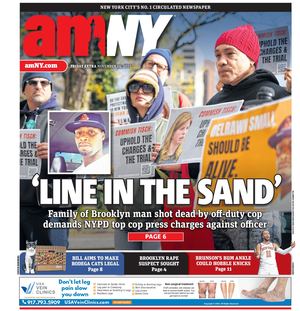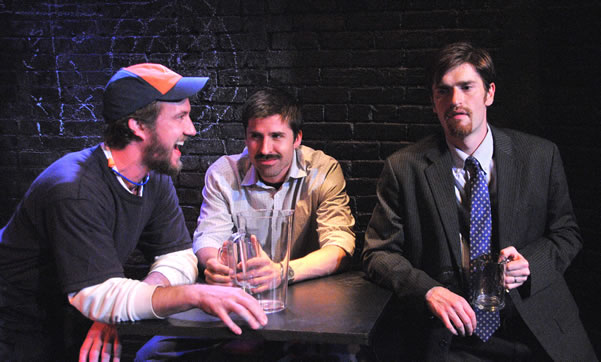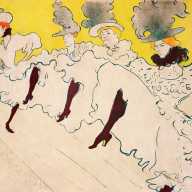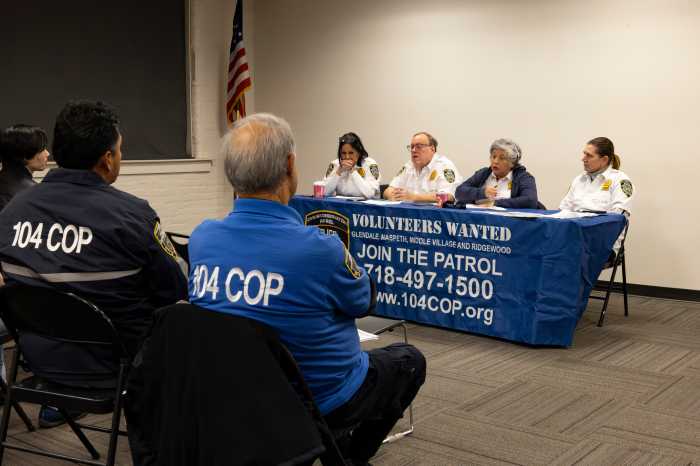BY ALINE REYONLDS
John Doe concerns are timeless, contemporary
Exploitation. Dissatisfaction. Revolution.
These underlying themes of the Occupy Wall Street (O.W.S.) movement are also the central concerns of “On the Line” — playwright Joe Roland’s intriguing tale of three lifelong buddies who become embroiled in a months-long strike against a company that all but destroys their hometown.
We never find out the name the town (or even the region) the story takes place in — nor are we told the time period or which industry the characters work in.
That “John Doe” gesture, says the playwright, is meant to cement the notion that the discontent we’re seeing at Zuccotti Park, and on the stage of the Canal Park Playhouse, “can take place anywhere,” explained Roland.
Despite this lack of critical information, “On the Line” successfully exposes the grim realities of men and women victimized by large industries — and, specifically, by the merciless corporate heads who hoard the wealth.
That phenomenon, of course, predates the current protests at Zuccotti Park and elsewhere. Roland, who wrote the play in 2003, deems the play’s correlations with O.W.S. a “happy accident.”
“When I wrote the play, I was probably as pissed off as the people down at O.W.S. are now about the pressure on working people,” said Roland (referencing President Bush’s slashing of veterans’ benefits around that time). Diverging from O.W.S., the play underscores the fragility of communities that are wholly dependent on the success of their signature industries.
“[The company in the play] really is the beating heart of the town, financially and in many other ways,” said director Michael Tisdale. In recent decades, he noted, Americans have witnessed these types of meltdowns in cities like Cleveland and Detroit.
When the company’s owner, Dolan, breaks the good faith negotiations with the union that represents his workers, the workers go on strike — presenting a fork in the road for Jimmy, Mikey and Dev that ultimately tests their longstanding friendship.
“These guys are trying to hold down jobs and make a living wage to provide a living for their families, and they’re being threatened on some level by management,” said Tisdale. “Once they can’t escape into that ‘remember the good old days’ mode anymore, because things are so different in the present reality, it pulls their relationship apart at the seams.”
The demands of adult and family life particularly wear on the friendship between Dev and Mickey, after Mickey accepts a job in the company’s corporate division (which Dev and others in the town consider to be an unforgivable betrayal of trust).
Tisdale interweaves the disparate work and bar scenes in seamless fashion. He and Roland also succeed at compensating for the theater’s diminutive stage space. Their use of lockers, stools, video projection and a bar table allows the audience to clearly visualize the diverse settings.
While actor Matt Citron (“Jimmy”) is a good storyteller, his colleague, Jacob Knoll, does a phenomenal job playing Dev. Though his emotions often get the best of him, the character’s rebellious tendencies are channeled into stalwart activism during the strike.
A combination of history, life experience and family inspired Roland’s play — which references Reagan’s supplanting of air traffic controllers in the early 1980s following a union strike that was deemed illegal. A decade later, Roland found himself amid an employee’s strike while working for upscale east side hotel (part of a citywide strike that threatened the tourist industry).
Both the playwright’s grandfathers were blue-collar men — one a teamster, and the other, a security guard at the Brooklyn Navy Yard.
Tisdale, raised in Lorain, Ohio, is also from a blue-collar family, and recently spent three years interviewing working-class people whose loved ones perished during combat in Iraq.
“There must be something in my brain that keeps putting me in contact with blue-collar stories,” said Tisdale wryly.
Little did Tisdale know that he would embark this summer on a show that touches on such a seminal, class-related movement in our nation’s history.
“[The company in the play] really is the beating heart of the town, financially and in many other ways,” said director Michael Tisdale. In recent decades, he noted, Americans have witnessed these types of meltdowns in cities like Cleveland and Detroit.
When the company’s owner, Dolan, breaks the good faith negotiations with the union that represents his workers, the workers go on strike — presenting a fork in the road for Jimmy, Mikey and Dev that ultimately tests their longstanding friendship.
“These guys are trying to hold down jobs and make a living wage to provide a living for their families, and they’re being threatened on some level by management,” said Tisdale. “Once they can’t escape into that ‘remember the good old days’ mode anymore, because things are so different in the present reality, it pulls their relationship apart at the seams.”
The demands of adult and family life particularly wear on the friendship between Dev and Mickey, after Mickey accepts a job in the company’s corporate division (which Dev and others in the town consider to be an unforgivable betrayal of trust).
Tisdale interweaves the disparate work and bar scenes in seamless fashion. He and Roland also succeed at compensating for the theater’s diminutive stage space. Their use of lockers, stools, video projection and a bar table allows the audience to clearly visualize the diverse settings.
While actor Matt Citron (“Jimmy”) is a good storyteller, his colleague, Jacob Knoll, does a phenomenal job playing Dev. Though his emotions often get the best of him, the character’s rebellious tendencies are channeled into stalwart activism during the strike.
A combination of history, life experience and family inspired Roland’s play — which references Reagan’s supplanting of air traffic controllers in the early 1980s following a union strike that was deemed illegal. A decade later, Roland found himself amid an employee’s strike while working for upscale east side hotel (part of a citywide strike that threatened the tourist industry).
Both the playwright’s grandfathers were blue-collar men — one a teamster, and the other, a security guard at the Brooklyn Navy Yard.
Tisdale, raised in Lorain, Ohio, is also from a blue-collar family, and recently spent three years interviewing working-class people whose loved ones perished during combat in Iraq.
“There must be something in my brain that keeps putting me in contact with blue-collar stories,” said Tisdale wryly.
Little did Tisdale know that he would embark this summer on a show that touches on such a seminal, class-related movement in our nation’s history.




































